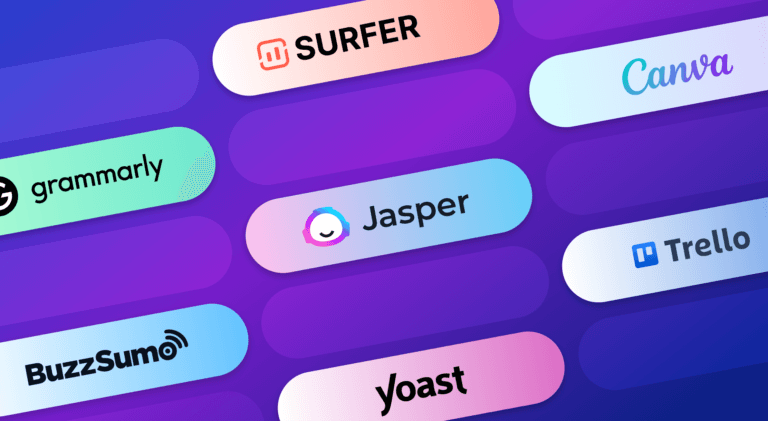20 Tips For a Successful B2B Social Media Strategy (With Examples)

B2B social media marketing strategy can be a tough nut to crack. If you’re selling a product that is difficult to explain, a hard sell on social media may seem like an impossible task.
But the biggest mistake you can make is assuming there is no place for your brand on social media. And while the B2C audience is undoubtedly different from your typical B2B prospect, you can still find success if you keep your business goals in mind and remember what makes social, well, social.
We’ve already tackled some of the most common B2B social media strategies in this article, but we wanted to give B2B marketers a step-by-step guide to creating their strategy from scratch.
In this post, we’ll outline the critical steps to creating a B2B social media marketing strategy. We’ll also share some examples of the best B2B social media campaigns by companies doing it right.
20 B2B Social Media Strategy Tips
Before anything else, always remember that social media is a two-way communication channel with your customers, prospects, and fans. So don’t just broadcast your message, but be ready to listen, engage and foster relationships with your community and use these 20 B2B social media strategy tips to level up your game:
1. Paid advertising
When it comes to B2C, organically reaching your target audience is more accessible than that in B2B. B2B marketers must be wondering what they did wrong. But that’s not the case. You can gain traction with your target audience quickly; however, you need to level up your game using paid advertising.
You can run ads on Facebook, Instagram, and YouTube or collaborate with influencers who support your cause. Add all of this with your brand voice, missions, and aesthetics, and your social media game is all set to rise.
For example, Uber has collaborated with Lyft run and uses its paid ad campaigns to drive more sales while also maintaining its aesthetics, as you can see in the below picture making it one of the best B2B social media campaigns.

So, fear not and use paid advertising to accelerate your social media growth.
2. Brand colors
Choose your brand colors wisely and stick to them for long so that your target audience remembers who you are every time they see that color. Yes, that’s the power of branding. When you use the right colors and fonts, your target audience resembles your brand every time they see that color or font.
Just how Jumbotail is ruling the B2B marketplace with their fantastic color and font mixture.

3. Indulge your customers
Indulging your customers is the best way to grab more customers. If you involve customers’ stories, success, and practices, there are pretty high chances that they’ll reach back and feel connected to your brand. After all, customers are the real hero.
Here’s how Notion did it and won their customer’s hearts:

4. Share testimonials
People correlate and trust other people. That’s where the magic of testimonials comes in. these are a great and powerful tool to grab your audience’s heart and relate with them. This will not only help you to capture more customers but retain the existing ones too.
You can easily share your testimonials through Instagram posts, stories, reels, or Facebook posts. This is a great way to level up your B2B social media marketing strategy. Here’s how Sendlane did it:

5. Show your products
Show your products and how they’re used to the customers to get connected with the product. The other great thing about a demo is that it shows how your product works. When you have the right audience and a product they’re interested in, the next step is to show them how your product works and why they should buy it.
One example of such B2B social media campaigns is Away, the luggage company. Their Instagram feed is filled with travelers using their product in exciting locations like Machu Picchu or outside a cute cafe in Paris. It’s aspirational, but it also helps reduce uncertainty (e.g., “will this bag protect my stuff if I go on a safari?”) and highlight the product’s value prop (“this luggage can go anywhere”).
6. Build content and social media pillars
In the context of B2B marketing strategy, micro-content is a series of text, visual, or audio assets that are built around a single idea or theme. Microcontent is getting 1000 small topics from one major issue in straightforward terms. The goal is to break one core idea down into bite-sized pieces of content easily digestible by your audience.
This B2B social media marketing strategy is helpful for a few different reasons:
● First, it’s efficient. You’re killing two (or even three) birds with one stone. It gives you more content for your money and helps you produce more in less time.
● Second, it works for all kinds of audiences. The focus on keeping your content bite-sized means there’s something for everyone — whether they want to text, visuals, or audio (or all of the above).
● Lastly, it offers flexibility. Micro-content allows you to repurpose your more considerable asset in various ways to reach different audiences across multiple channels. This strategy can be helpful when you have limited resources and need to make each piece of the content count.

7. Document your journey
The most efficient yet underrated B2B marketing strategy trick is documenting your journey and showcasing it through video content. I know some big brands have been scared about this trend in the past because of fear of trolls and negative comments.
But I’d argue that if you have a great team, excellent product/service, and are posting good content – then you shouldn’t be afraid to get out there and show yourself (and let them come to you) through videos, document your journey, and let people know how much it takes to be you!
8. Use your team as models
In B2B social media marketing, there’s nothing more important than authenticity. That’s why it’s always better to use photos of real people like your employees or team members in your ads and promotional materials rather than paid models.
Not every brand can afford a supermodel endorsement deal. But that doesn’t mean you have to resort to cheesy, outdated stock photography for all of your marketing needs. The best way to capture the emotions you want to convey is by using real people in your creative materials. Customers will respond better to an image of a natural person than a stock photo of a fake one.
9. Share your brand’s leaders’ thoughts
We’re living in a time of social media and social business. To succeed, you need to be engaged, transparent, and connected. Sharing leaders’ thoughts from your brands can invoke so many emotions in your target audience, and you can leverage this to sell more.
10. Put efforts into organic growth
The first point states that paid ads are a great source to reach more people; however, this still cannot beat the organic reach. Organ ic reach is natural and is proved to yield results later down the lane.
Today’s customers are savvier, more informed, and have more options than ever before. They expect you to be on top of your game, online and offline. This means you need to take a long-term view of your relationship with your customers, which can only be done by delivering good results and top-notch content.
11. Listen to your customers
We’ve already talked about how you can use social media to answer customer questions and help with your product or service.
But don’t forget that this is also a great way to deepen your relationship with your customers. Social media users are more likely to engage with content that encourages them to share their thoughts and opinions – like polls, contests, and other interactive content.
The entire concept of content marketing functions on trust and finds its foundation in creating long-term relationships. Stop selling and let the people come to you by providing them with exciting and valuable information that they want.
12. Build a strong community
Satisfied customers can be your most loyal advocates, and a customer community is a great way to empower them. The world of e-commerce is changing. Customers are no longer looking for just a solution to their problem; they want to know that they can trust the company behind it.
That’s why the most successful e-commerce businesses are building communities around their products and services, turning their customers into loyal brand advocates. This is not marketing. Marketing is one-way communication between you and your customers. Community is two-way communication: You offer value to them (through content or other resources), and they give something back to you (through feedback and ideas).
For example, DigitalMarketer has a strong community, and they’re connected through Facebook groups.
13. Emphasize more on your copy
According to Curata, only 30% of B2B marketers believe their organizations are effective at content marketing. So what stops the other 70% from creating great content? One of the biggest reasons companies struggle with their content marketing efforts is that they don’t know how to write compelling copy that inspires action.
To stand out in today’s crowded market, you need to create unique content that engages your audience and speaks directly to their pain points. And who can even forget Zomato’s excellent social media copy?
Here’s a snippet of it:

14. Add sarcasm to your posts
A study by the Ehrenberg-Bass Institute found that humor and emotion in advertising led to more brand recall, more purchase intent, and higher persuasion scores. The research also showed that consumers were more likely to “like” an ad if it evoked an emotional response and shared it with their friends. And as we know, getting likes and shares is suitable for your Facebook to reach (ergo, your overall visibility).
Just like in this picture, Zomato has used this Bollywood song to invoke emotions and added humor to the post while sharing their message.

15. Share real-life experiences
Be it B2B, B2C, D2C, or any other form of marketing; we’re dealing with humans only at the end of the day. So adding emotions, real-life moments, hardships, events, and success with your target audience can help them relate more to you while also building a bond.
16. Hop on to trends
These days trends are the new normal. People connect more with trends, hashtags, and challenges. So try to hop on to recent trends as and when they come. Or even come up with your challenges and trends and host giveaways to let people know you care about them. At the same time, you can quickly increase your growth.
17. Align your social media goals with your business goals
By aligning your social media goals with your business goals, you ensure no setbacks. While it’s essential to grow your social media, it is more important to grow your business offline. And to make sure both go in handy, you should prepare a plan which teaches both worlds.
18. Get over with the primary content
B2B social media marketing can be a boring industry, but your content need not be the one. Try on with reels, videos, podcasts, and many more. They’re a million ways to get your information out there excitingly.
You can use either of these to get over with your primary content:
● Add humor to it
● Try reels and videos
● Host giveaways
● Come live on YouTube, Facebook, and Instagram.
● Try carousels
19. Adapt your content to social media platforms
What might work on Instagram will not work on LinkedIn, and what might work on LinkedIn will not work on Instagram. All the platforms support different types of content, and you should be well versed with them.
But, creating different content for different platforms is a challenging task. Here’s how you can use the same content for other platforms-
● Convert long-form content into carousels.
● Podcasts into reels.
● Short-form content into stories

20. Focus more on relevant platforms
B2B companies mostly hang out on platforms like LinkedIn and Twitter. Find out your relevant media initially and focus only on those two to grow initially. When you hang off these two platforms, move on to Instagram and Facebook.

B2B’s social media marketing strategy can be a tough nut to crack; however, using these strategies can smooth out the process. But remember, whether it is B2B, B2C, D2C, or any other form, we’re at the end dealing with humans only. So add emotions to your content and humanize it. Create what your audience wants and post it on the relevant platforms using different content forms. You can also use paid ads, but your focus should never shift from organic reach.
FAQs
B2B markets are the ones wherein the end-users are brands and companies and not consumers.
A B2B social media strategy is one wherein the B2B brand crafts a social media strategy to grow its social media and drive sales while building its brands.
To make a successful B2B social media strategy, you need to answer these questions-
● Who is your target audience?
● What content do they want to see, and what problems are they facing?
● How is your product solving their problem?
● How can your product make their lives easier?
Once you know the answer to these questions, you can easily create content around them.
Some tips are as follows:
● Try paid ad campaigns
● Engage with your audience quickly
● Post video format content
● Solve users’ problems
● Listen to your target audience
LinkedIn ranks at the top for B2B social media marketing, followed by Twitter and Instagram.
Latest Blogs
Learn how to rank on AI search engines like ChatGPT, Perplexity, and Gemini by optimizing your content for authority, structure, and relevance. Stay ahead in AI-driven search with this strategic guide.
Explore the best healthcare SEO services for your medical practice. Improve online visibility and effectively reach more patients in need of your services.
Discover top social media agencies specializing in banking solutions, enhancing financial services and driving engagement.
Get your hands on the latest news!
Similar Posts

Artificial Intelligence
5 mins read
Enhance Your Writing Efficiency: Must-Have Content Writing Tools for Marketers

Marketing
5 mins read
9 Key Strategies To Increase Twitter Reach

Marketing
6 mins read